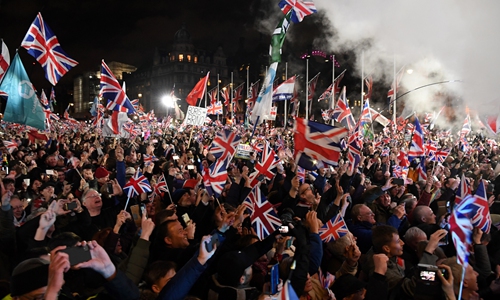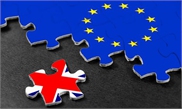
Brexit supporters wave Union flags as the time reaches 11 o'clock, in Parliament Square, venue for the Leave Means Leave Brexit Celebration in central London on Friday, the day the UK formally left the European Union. Photo: AFP
Britain on Tuesday admitted that it may break international law by rewriting parts of its Brexit divorce treaty relating to Northern Ireland, sparking widespread criticism and clouding the latest round of fraught European Union (EU) trade talks.
Irish Foreign Minister Simon Coveney, whose country is the EU nation most affected by Brexit, warned that reneging on 2019's divorce pact "could seriously erode and damage political trust."
European Parliament President David Sassoli added: "Any attempts by the UK to undermine the agreement would have serious consequences."
After leaving the EU earlier in 2020 following a bitterly divisive referendum, Britain is racing to agree a trade deal with Brussels as the clock ticks down to a crunch EU summit in mid-October.
An eighth round of talks began in London on Tuesday.
British Prime Minister Boris Johnson has said Britain will cope with the economic dislocation of leaving the transition period at the end of 2020 without a deal, despite also facing the coronavirus crisis.
But the prospect has caused the pound to slump on currency markets and made UK businesses increasingly anxious.
Johnson's government has urged Brussels to show "more realism" about dealing with a heavyweight economic power on its newly shrunk borders.
It intends on Wednesday to present legislation that could undercut its obligations in the Withdrawal Agreement it agreed with the EU in 2019.
It insists the changes are technical and required to ensure businesses in Northern Ireland can enjoy friction-free trade with both the EU and the rest of the UK from 2021.
To a question in parliament, Northern Ireland Secretary Brandon Lewis conceded: "Yes, this does break international law in a very specific and limited way." Lewis said there were "clear precedents" for such a move as circumstances change.
But in Dublin, Coveney said the comments were "gravely concerning" and said he had asked the Irish ambassador to raise the issue directly with London.
AFP


